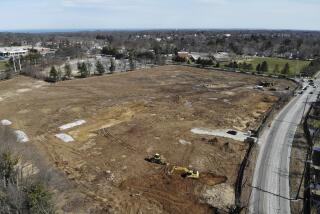School Integration Debate Shatters Peace : Connecticut: West Hartford has long been a haven for middle- and upper-income whites. But those days are gone.
- Share via
WEST HARTFORD, Conn. — For decades, peace and harmony have been as common as station wagons and lawn mowers in this affluent bastion of the American institution known as “the suburb.”
But now tranquillity is hard to find. Anger and resentment, argument and shouting have become the new standards of civil behavior as the city tries to integrate its schools.
West Hartford, where longtime residents like to compare their high-brow demeanor to natives Noah Webster and Katherine Hepburn, for half a century has boasted one of the nation’s top public school systems--albeit one with few minority children.
But real estate values, once an insurmountable wall preventing minorities from living in West Hartford, sank sharply in the past decade as Connecticut’s economy sagged.
Cuts in military spending, major layoffs at insurance companies and a tailspin in the airline industry forced property values down.
Immigrants from Vietnam, Puerto Rico, Russia and Eastern Europe--as well as from such urban battle zones as Hartford--have flocked to a town whose previous civil arguments had mostly to do with the timeliness of leaf collection.
In the southern part of town, one of every three students now comes from a family whose income is below the U.S. government’s so-called poverty line.
West Hartford, which also kept out low-income families by heavily restricting construction of multifamily dwellings, is becoming more racially balanced as less-affluent families buy houses once too expensive for them.
West Hartford, for decades a haven for middle- and upper-income whites, is now in the midst of an age-old battle pitting racism and prejudice against morality and justice.
“My brother and I used to talk about prejudice and bigotry over a glass of brandy after dinner,” said Ralph Bustamante, a West Hartford schoolteacher.
“But in recent weeks, our arguments got so bad (that) he is not welcome anymore in my house and I won’t go to his.”
The focal point of the argument is a campaign to integrate the schools. Some town schools have a large proportion of minorities and non-English speakers and are suffering from overcrowding and lower performance than others.
Several plans were considered, including busing, which sparked a near-revolt among the 60,000 residents of a community that has been known for its well-run government, excellent education system and civility.
Jeffrey Renert, a businessman who lives near an elementary school in West Hartford, said he has considered moving away because of the fighting.
“I went to a Super Bowl party and everything was great until some twit mentioned schools,” Renert said. “In seconds people were shouting and I really thought there was going to be a fistfight.”
School officials are forced to make changes in part because the town is in violation of a 1969 state law that requires districts to racially balance its schools.
Lawns are dotted by signs supporting or opposing various school board plans. Meeting halls are packed with angry people and moving companies are reporting a heavy business in relocating families. But relocation often means added pressure to the city government.
“I have seen a complete change in my customer base,” said Julie Goldfarb, a West Hartford Realtor for more than 30 years.
“I see a lot of longtime residents saying they just want enough money to pay off the mortgage and they don’t care about any profit,” Goldfarb said.
Susan Tolcott of West Hartford said she is concerned that denial was so firmly a tactic pursued by city officials for so many years that now few have the skills to deal with reality.
“To me, West Hartford isn’t a charming little suburb anymore,” she said. “Now it is a typical city facing typical problems--the biggest of which is that few here have learned the skills over the years to deal with racism, poverty, multiple languages.”
More to Read
Sign up for Essential California
The most important California stories and recommendations in your inbox every morning.
You may occasionally receive promotional content from the Los Angeles Times.













